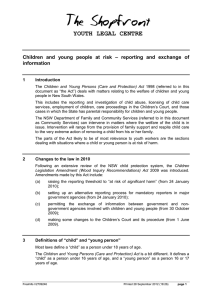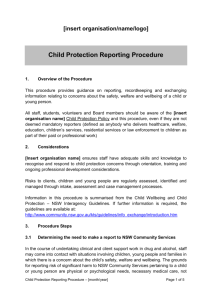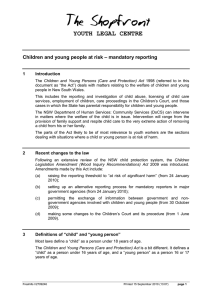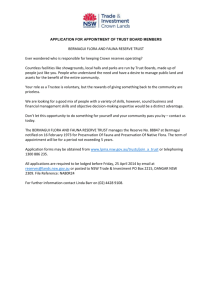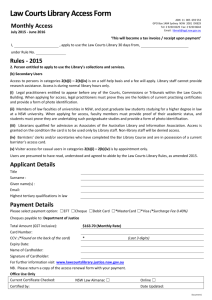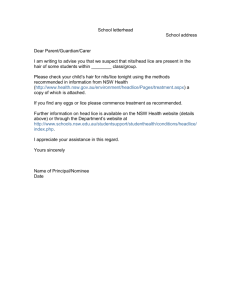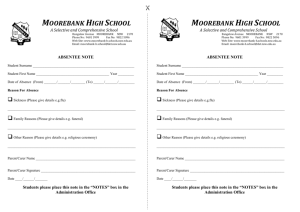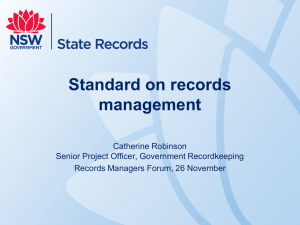Child Protection Policy BB 2012x
advertisement
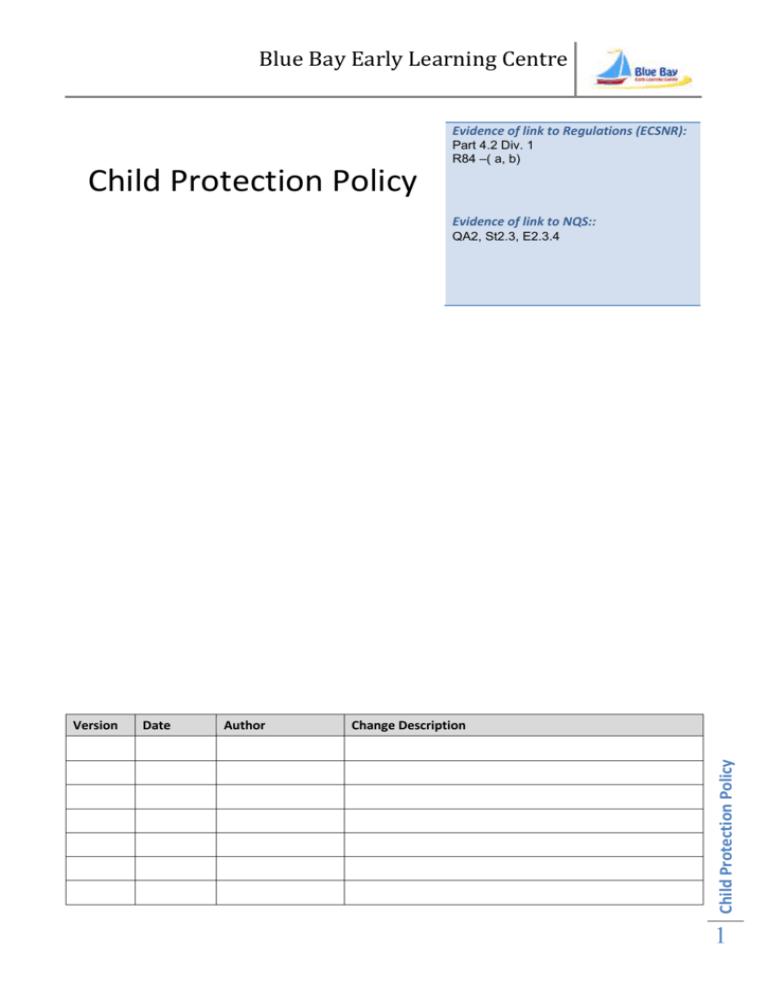
Blue Bay Early Learning Centre Evidence of link to Regulations (ECSNR): Part 4.2 Div. 1 R84 –( a, b) Child Protection Policy Evidence of link to NQS:: QA2, St2.3, E2.3.4 Date Author Change Description Child Protection Policy Version 1 Blue Bay Early Learning Centre Policy Objective To identify and respond to children and young people at risk of significant harm. Rationale Keep them Safe legislation reinforces the principle that care and protection of children and young people is a shared responsibility. This responsibility rests firmly with parents, families, members of the community and those who work with children. The goal of a shared approach to child wellbeing is for all children in NSW to be healthy, happy and safe and to be able to grow up belonging in families and communities where they have the opportunity to reach their full potential. It is therefore important that children who are considered at risk of significant harm receive early intervention and support to achieve positive outcomes. This support also extends to families. Relevant Legislation: Education and Care Services National Regulation, 2012 Children and Young Persons (Care and Protection) Act 1998 NSW NOTE: This policy was written using NSW Child Protection Legislation. If you are in a different state/territory the basic principles and intent would still apply, but the notification procedures/systems will differ in each state/territory. Strategies and practices The Act: Refers to the Children and Young Persons (Care and Protection) Act 1998 Child: According to the Act, is a person who is under the age of 16 years. Young Person: Under the Act, a young person is defined as a person aged 16 years or above, but under the age of 18 years Harm: Physical and/or psychological damage or injury experienced by a child or young person as a consequence of one or more of physical, psychological or sexual abuse, ill-treatment or neglect. The current and future impact of the harm needs to be considered in making the decision about substantiation of harm. Risk of Significant Harm What is meant by "significant" in the phrase "to a significant extent" is that which is sufficiently serious to warrant a response by a statutory authority, irrespective of a family's consent. What is significant is not minor or trivial and may reasonably be expected to produce a substantial and demonstrably adverse impact on the child's or young person's safety, welfare or wellbeing. In the case of an unborn child, what is significant is not minor or trivial and may reasonably be expected to produce a substantial and demonstrably adverse impact on the child. Child Protection Policy Parent or Carer: “Parent” is defined in Section 3 of the Act as a person having the parental responsibility for the child or young person. This may therefore apply to persons other than the biological parent – such as persons exercising parental responsibility within the kinship group of the child or young person. 2 Blue Bay Early Learning Centre Mandatory reporters A mandatory reporter is an individual required by law to report to Community Services when they have reasonable grounds to suspect that a child, is at risk of significant harm from abuse or neglect and that those grounds are identified during the course of a person’s work. All staff members working in education and care services are mandatory reporters. While it is mandatory to report children aged 0-15 years at risk of significant harm, it is not mandatory to report young people aged 16-17 years or unborn children. Professional judgment should be used in deciding whether concerns about the safety, welfare or wellbeing of an unborn child or a young person warrants a report to Community Services. When to make report The NSW Mandatory Reporter Guide has been developed to assist reporters to decide if any of the following conditions are present to a significant extent: physical abuse neglect - supervision - physical shelter/environment - food - medical care - mental health care - education sexual abuse problematic sexual behaviour psychological harm relinquishing care carer concerns - parent / carer substance abuse - parent / carer mental health - parent / carer domestic violence unborn child. A series of acts or omissions that when viewed together may establish a pattern of risk of significant harm (cumulative impact) may also be an indicator that a child is at risk of significant harm. Where a staff member has reasonable grounds to suspect risk of significant harm, they should: 1. Report their concerns to the Nominated Supervisor or the Room Supervisor 2. Document their concerns 3. Use the NSW Mandatory Reporter Guide (MRG) to assess whether their concerns meet the threshold of risk of significant harm. The MRG will assist mandatory reporters to determine whether they should: Child Protection Policy 3 Blue Bay Early Learning Centre Make a report to the NSW Community Services Child Protection Helpline or Make a referral to other professionals and/or support agencies Document and continue the relationship. However, if there is an immediate danger to the child or young person the Police and/or the Helpline should be contacted directly. Reasonable grounds refers to the need to have an objective basis for suspecting that a child or young person may be at risk of significant harm, based on: first hand observations of the child, young person or family what the child, young person, parent or another person has disclosed How to make a report If the NSW Mandatory Reporter Guide instructs a staff member to make a report staff need to contact Community Services. The NSW Child Protection Helpline is the contact for mandatory and non-mandatory reporters who have concerns about a child’s safety, welfare and wellbeing. Phone 133627 132111 for mandatory reporters for non-mandatory reporters Reports to the Child Protection Helpline are confidential. Any person who makes a report is afforded protection by law if they make a report in good faith. The Child Protection Hotline will tell mandatory reporters whether the report they have made meets the threshold of significant harm or not. Staff will document any concerns, observations, or disclosures made to them. Staff will notify the Director if it is thought that a child is at risk of significant harm or if the staff member has any concerns that the child may be at risk of harm. The Director/ staff member will use the online Mandatory Reporter Guide (MRG) to establish if a report should be made. The MRG report will be printed and filed on the child’s file in the office. The Director/staff member will take the action recommended by the MRG. This may include making a report to the Child Protection Hotline. When the MRG advises that the report does not meet the statutory threshold, staff will continue to offer referrals to local services and work collaboratively with other organisations to help keep children safe. All staff will note that they are mandatory reporters and are responsible for reporting children at risk of significant harm. All information will remain confidential, and be filed in the office. Child Protection Policy Staff Procedure for Reporting Children at Risk of Significant Harm. 4 Blue Bay Early Learning Centre Talking to Parent/s It is not the role of staff to confront the parent/s where there are concerns about the welfare of the child. Where such concerns exist the Director will be responsible for determining what, if any communication is initiated with the parent/s. Communication with the parent will be determined after consulting the MRG. The safety, welfare and wellbeing of the child must always be the first consideration. Documentation Complete NSW Mandatory Reporter Guide and print off the final decision Document and Record the information - as soon as possible in your own hand writing - if mistakes are made simply cross them out and initial ( do not write multiple drafts) - Document facts only (avoid opinions/judgement) - include date, time, circumstance - what you see - what you hear - exactly what the child says (do not rephrase or replace any words such as slang or swearing) - describe any gestures or sound effects made by the child - describe the size (eg size of a 10 cent piece), shape (eg round, elongated), colour (purple, red, yellow etc) and location on the body of any injury such as bruises, marks, burns - Sign and date your documentation Hand your report to the Director – if not available hand your report to your supervisor The report must be filed in a secure location NSW Community Services’ Child Protection Helpline for mandatory reporters – 133627 NSW Mandatory Reporters Guide – www.sdm.community.nsw.gov.au/mrg/app/summary.page NSW Department of Premier and Cabinet Keep Them Safe Website www.keepthemsafe.nsw.gov.au/home References Education and Care Services National Regulation, 2011 New South Wales Interagency Guidelines for Child Wellbeing and Child Protection Children and Young Persons (Care and Protection) Act 1998 (Care Act). Child Protection Policy Important Telephone Contact Numbers and Websites 5 Blue Bay Early Learning Centre Children Legislation Amendment (Wood Inquiry recommendations) Act 2009 NSW Department of Premier and Cabinet. Keep Them Safe website: www.keepthemsafe.gov.au Resources NSW Mandatory Reporters Guide – www.sdm.community.nsw.gov.au/mrg/app/summary.page NSW Department of Premier and Cabinet Keep Them Safe Website – www.keepthemsafe.nsw.gov.au/home Children’s Education & Care Quality Authorityhttp://www.acecqa.gov.au/ Policy Written by: Position: Date: Approved by: Approved Date: Next review date: Child Protection Policy Staff Sign: 6
